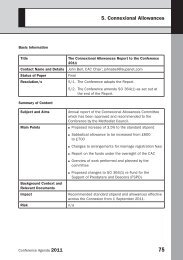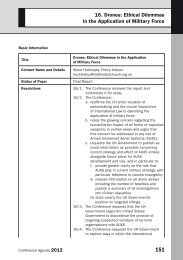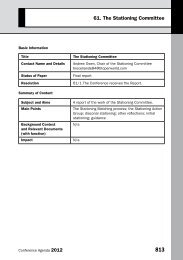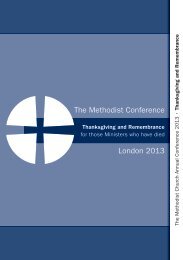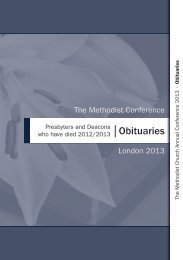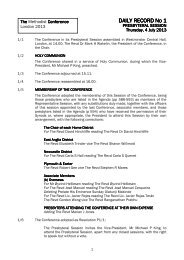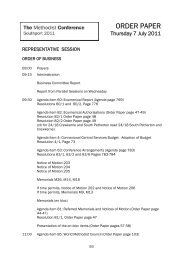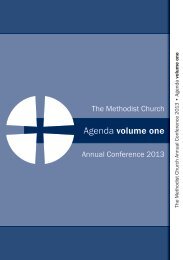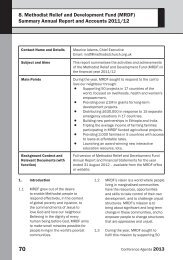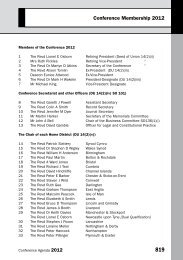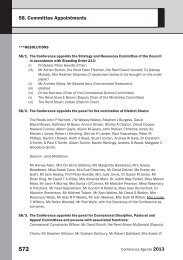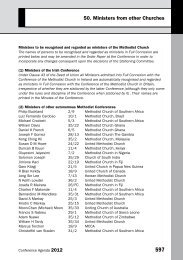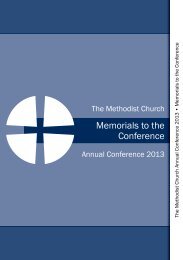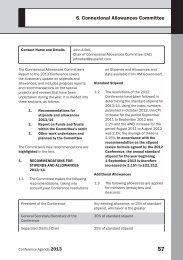Agenda Volume 3 - Methodist Conference
Agenda Volume 3 - Methodist Conference
Agenda Volume 3 - Methodist Conference
Create successful ePaper yourself
Turn your PDF publications into a flip-book with our unique Google optimized e-Paper software.
57. The Fruitful Field Project<br />
166.2 Scholarship, research and innovation:<br />
engaging in academic study projects,<br />
research projects or innovative and<br />
creative thinking, thus ensuring that<br />
all posts have protected space within<br />
them for creative thinking and for<br />
nurturing new thoughts and insights<br />
166.3 Working in partnership across<br />
the Church: nurturing links with<br />
volunteers, office-holders within<br />
Circuits and Districts, District Policy<br />
Committees and District Chairs;<br />
engaging with the development of<br />
connexional policies and strategies in<br />
relevant areas of expertise<br />
166.4 Working in partnership beyond the<br />
<strong>Methodist</strong> Church: nurturing links<br />
with ecumenical partners and other<br />
partner organisations<br />
166.5 Quality assurance and enhancement:<br />
working to enhance the quality<br />
and effectiveness of pathways,<br />
opportunities, programmes and<br />
resources through enhancing their<br />
design and their delivery.<br />
167 We recommend that, within each<br />
regional team, one postholder<br />
should be identified as the regional<br />
team’s coordinator, assuming<br />
responsibilities (a) for enabling a<br />
collaborative and supportive way of<br />
working within the regional team, (b)<br />
for the performance, efficiency and<br />
effectiveness of the regional team,<br />
(c) for the regional team’s overall<br />
contribution towards the goals of the<br />
Network, and (d) for being a primary<br />
point of contact with the Network’s<br />
coordinating team (see paragraph<br />
178.3 below). This coordinating role<br />
draws on good practice currently seen<br />
in the Learning and Development<br />
Network of the <strong>Methodist</strong> Church<br />
in Scotland and the Wales Training<br />
Network, where benefits have been<br />
identified to having a manager or<br />
director who coordinates the work of<br />
the other members of staff who work<br />
across the nations.<br />
168 We recommend that the regional<br />
teams work across regions which<br />
are bigger than Districts but smaller<br />
than the existing Regional Training<br />
Networks in England (see paragraph<br />
68 above). A recommendation about<br />
the number of regional teams, and<br />
consequently about the size of the<br />
regions which the team should serve,<br />
is necessarily strongly dependent<br />
upon the financial resources which<br />
can be dedicated to supporting<br />
regional posts. It has long been<br />
evident to the Committee that it<br />
would not be possible to support 31<br />
teams, one serving each District.<br />
However, it has also been evident<br />
to the Committee that some of the<br />
Regional Training Networks in England<br />
have struggled, for reasons both of<br />
geography and workload, to support<br />
posts at the regional level which are<br />
capable of providing a service across<br />
the region. Efficient and realistic<br />
teams could therefore be envisaged<br />
working across regions which are<br />
bigger than Districts but smaller<br />
than the existing Regional Training<br />
Networks in England.<br />
<strong>Conference</strong> <strong>Agenda</strong> 2012 711



